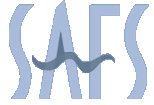UW Aquatic & Fishery Sciences Quantitative Seminar
Charlotte Boyd and Elizabeth Skewgar
UW School of Aquatic and Fishery Sciences/ and UW Department of Biology
Identifying behavior modes from movement patterns in seabird tracks
Abstract
We present two approaches to analyzing seabird behavior from tracking data during central-place foraging. Skewgar's goals are to analyze the ecological context of behaviors during central-place foraging and migration. Boyd will use the observed patterns of movement to inform an individual-based foraging model for central-place foragers. Both model movement as a series of distinct random walks, with each behavior having a unique set of parameters characterizing its movements. Both estimate unknown behavioral states from observed movements, and seek to define behaviors with straightforward biological interpretations. Skewgar uses prior information from central-place foraging theory to extract movement parameters for two behaviors, whereas Boyd uses maximum likelihood and clustering techniques to identify an appropriate number of modes. Both approaches use remote-sensing technologies, but Boyd's GPS data is sampled much more frequently and evenly than Skewgar's Argos data. Boyd's birds can fly in the air, but Skewgar's can only fly underwater. They all favor small pelagic fish, and face competition from human fisheries.

